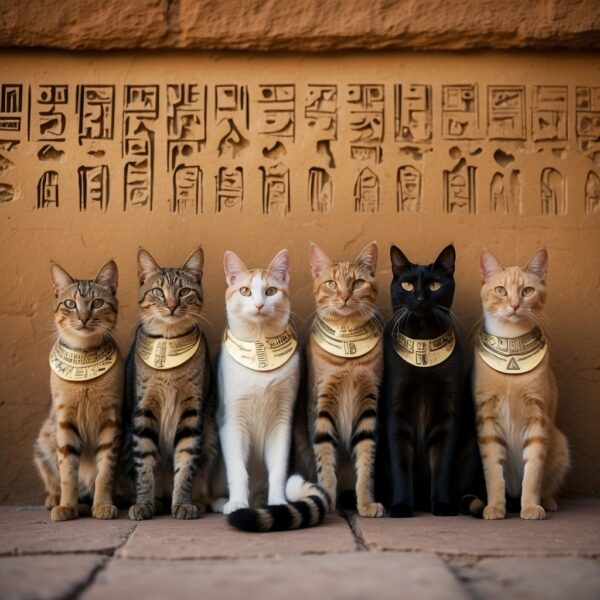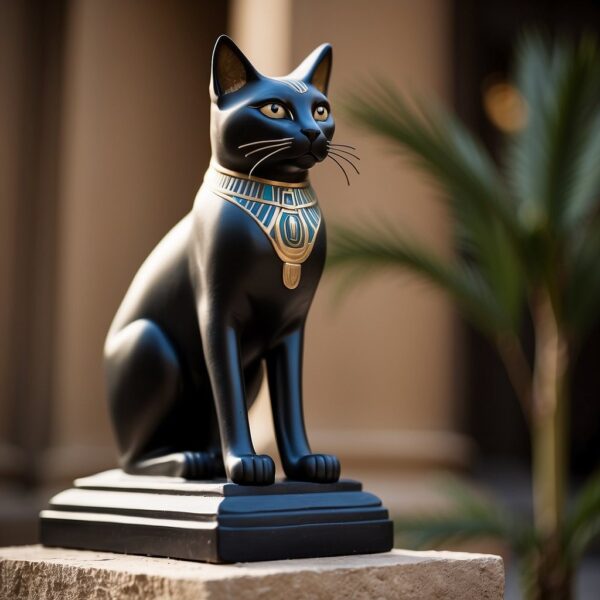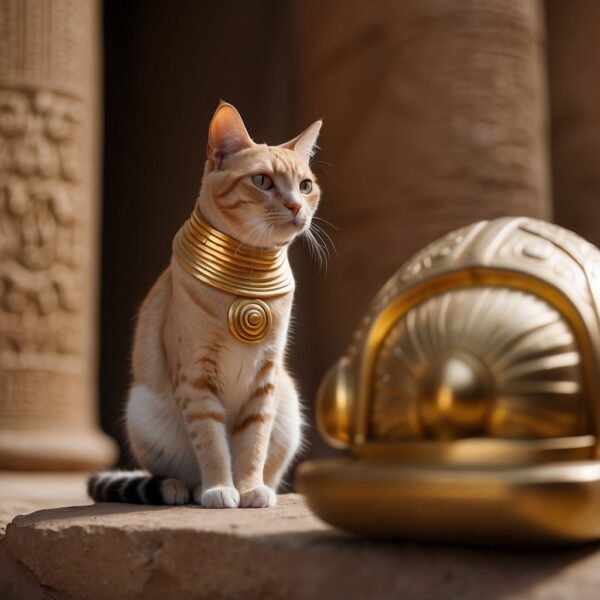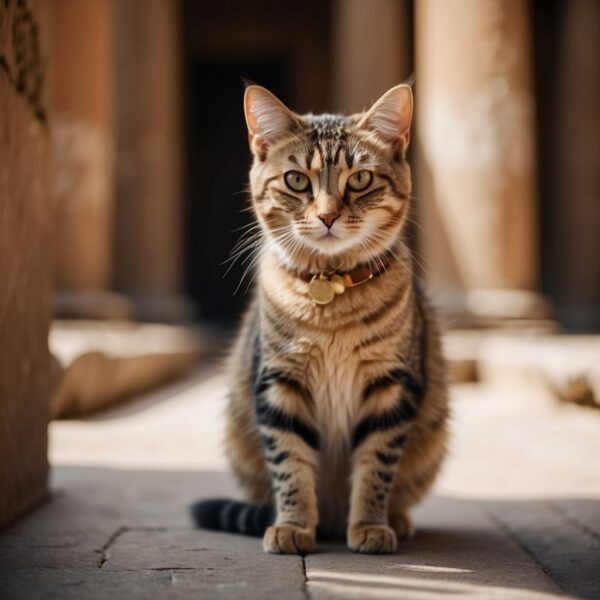
Egyptian Names For Cats
Selecting a name for a feline companion holds particular significance, especially when considering names with historical and cultural heritage, such as those from Egypt. Egyptian cat names offer a touch of elegance, mysticism, and a rich historical narrative that resonates with the ancient country’s enduring legacy and reverence for cats. In ancient Egypt, cats were venerated and sometimes worshipped, believed to carry the spirit of deities such as Bastet, the goddess of home, fertility, and childbirth, who was depicted with a cat’s head.
Choosing the right Egyptian cat name involves understanding the nuances behind the names, their meanings, and the aspects of Egyptian history and culture they represent. These names can come from various sources such as Egyptian gods and goddesses, pharaohs, historical figures, and characteristics valued in ancient times. Offering more than mere identification, they provide a deeper connection to the past and a unique identity to a feline friend. Both popular male and female names showcase the diversity and grandeur of Egyptian nomenclature, from majestic titles to those capturing the essence of Egyptian life and mythology.
Key Takeaways
- Egyptian cat names carry historical depth and cultural significance.
- Selecting a name reflects the traits and stories of Egyptian deities and cultural icons.
- Names can enhance the bond between pet and owner through shared heritage and identity.
Historical Significance of Cats in Ancient Egypt
Cats held a sacred position in the fabric of Ancient Egyptian society. They were venerated not only for their grace and poise but also for their utility in controlling pests and offering protection. Egyptians admired felines for their hunting skills, guarding grain stores from rodents, a crucial task that probably elevated them to a divine status.
Bastet, also known as Bast, symbolized the harmonious aspects of cats and became one of the most adored deities. Represented with a woman’s body and a cat’s head, she embodied motherhood, grace, and the sacred nature of cats. Her temples housed numerous felines, regarded as incarnations of the goddess herself, secure under her protective aura.
The reverence for cats extended to the realm of the pharaohs, where these animals often kept company with the royalty, sometimes appearing in portraiture alongside their lofty human counterparts. Cats’ prowess not only secured households but also had metaphysical significance, where they were believed to ward off evil spirits.
- Mafdet: The first known cat-headed deity, protector against serpents and malevolent forces.
- Sekhmet: A lioness goddess, symbolizing the fiercer aspect of cats with powers of healing and warfare.
The Egyptian Mau is an example of a direct lineage from ancient to modern times, reflecting the esteemed place cats have maintained through history. Egyptians’ esteem for these animals was profound, creating strict laws against their exportation as well as causing national mourning for a cat’s death. These measures underscored the cat’s exalted place in ancient Egyptian culture—a legacy that continues to captivate and influence.

Understanding Egyptian Cat Names
Egyptian cat names are deeply rooted in the country’s rich history and mythology. They often reflect the culture’s reverence for cats and the symbolic importance these felines held in ancient times.
Symbolism and Meaning
The symbolic significance of Egyptian cat names is often tied to qualities like strength, grace, and divinity. For instance, the name Aziza, which means precious, conveys a sense of value and rarity, while Dalila, meaning gentle, suggests a temperament that is serene and tender. The names given to cats were not just identifiers; they encapsulated the essence and characteristics that the Egyptians admired.
Connection with Egyptian Deities
Many Egyptian cat names are borrowed from the pantheon of Egyptian gods and goddesses, acknowledging their divine attributes. For example, Isis is a prominent name that denotes motherhood and magic, derived from the goddess revered for her magical prowess and maternal qualities. Similarly, Amunet translates to goddess of mystery, reflecting the enigmatic nature of the deity after which it is named. Each name holds a connection to the associated deity’s powers and mythology.
Influence of Hieroglyphs
Hieroglyphs—the writing system of ancient Egypt—contributes to the uniqueness of Egyptian cat names. The visual and phonetic elements in hieroglyphics are often mirrored in the names. For example, the name Nefertiti, which translates to the beautiful one has arrived, alludes to not only the phonetic sounds of the hieroglyphs but also the aesthetic value that the script holds. The use of hieroglyphs infuses these names with a rich linguistic heritage that is both distinctive and meaningful.
Choosing the Right Egyptian Cat Name
When selecting an Egyptian cat name, one should consider the historical and cultural significance of such names. They often embody the essence of Egyptian mythology and history, providing a regal touch to a cat’s identity.
Unique and Meaningful Names: For a unique Egyptian name, pet owners might be drawn to the names of gods and goddesses which offer an air of mystique and grandeur. Here’s a list of some distinguished names:
- Anhur: This name means the ‘god of war’, a fitting choice for a spirited kitten.
- Bastet: Once the Egyptian goddess of home, fertility, and childbirth, Bastet is commonly represented as a lioness or as a woman with a feline head, ideal for a protective or motherly cat.
- Cleopatra: Named after the renowned queen, this can suit a kitten with an elegant demeanor.
Note: For cats that exhibit a specific trait or personality, the names of deities associated with those characteristics make great choices. Hathor, for instance, the goddess of music and joy, might suit a cheerful and melodious cat.
For Kittens: A kitten’s playful nature could be echoed in a name that captures the lighter side of Egyptian mythology or daily life.
Reflecting Characteristics: Cats are known for their grace and prowess. As such, a name like Geb, the god of the Earth, could denote a robust and grounded feline.
When deciding on names, the resonating sound and ease of calling also matter. A cat is more likely to respond to a two-syllable name, making options like Mau, after the Egyptian Mau cat breed, both culturally rich and practical.
Ultimately, the chosen name should be a good fit for the feline, reflecting its individuality and possibly the characteristics of the historical or mythological figure it’s named after.

Popular Male Egyptian Cat Names
Choosing an Egyptian cat name for your male feline can be a nod to the grandeur and mystique of ancient Egypt, with many names reflecting the storied history and cultural significance of the era.
Names Inspired by Gods and Kings
Horus: As the falcon-headed god, protector of the ruler of Egypt, Horus is a name that conveys power and vigilance.
Amun: Often associated with kings and pharaohs, Amun was revered as the king of the gods and god of the wind.
Osiris: The god of the afterlife, Osiris embodies regeneration and resurrection, making it a fitting name for a cat with a remarkable presence.
Ra: The sun god, Ra, represents warmth and creation, a powerful moniker for a feline companion.
Ramses: Named after the great Pharaoh Ramses II, this name exudes strength and a royal bearing.
Tutankhamun: For a cat as precious as the boy king’s treasures, Tutankhamun (or simply ‘Tut’) is a name of historical significance.
Names Reflecting Qualities and Traits
Jabari: Meaning ‘brave’, this name is suited for a fearless and adventurous male cat.
Khalid: Translated as ‘immortal’, it’s a robust choice for a cat with an enduring spirit.
Sefu: Meaning ‘sword’, it might be apt for a cat with a sharp personality or appearance.
Tau: This name means ‘lion’, fitting for a cat with a majestic and powerful demeanor.
Anhur: Associated with war and the hunter, an ideal name for a cat with a bold and warrior-like attitude.
Asim: It implies protector, a strong name for a cat who watches over their home like a little guardian.
Popular Female Egyptian Cat Names
Female Egyptian cat names often pay homage to the rich and storied culture of ancient Egypt, drawing inspiration from its revered goddesses and queens to the many attributes of beauty and elegance reflected in the language.
Names Inspired by Goddesses and Queens
Isis: Revered as the epitome of motherhood and magic, the name Isis holds a sacred place in Egyptian history, making it a powerful name for a female cat.
Cleopatra: Symbolizing the ultimate blend of intelligence, political savvy, and allure, Cleopatra remains a timeless choice for a regal feline.
Nefertiti: Meaning “The beautiful one has arrived,” Nefertiti carries with it a legacy of beauty and royalty.
Hatshepsut: One of Egypt’s most successful pharaohs, the name Hatshepsut exudes a sense of strength and leadership.
Bastet: The cat goddess herself, Bastet embodies protection, playfulness, and ferocity.
Nut: This name honors the sky goddess who symbolizes the overarching canopy of the heavens.
Names Reflecting Beauty and Elegance
Hasina: Signifying ‘good’ or ‘beautiful,’ Hasina is a name that can represent a cat’s graceful nature.
Dalila: A gentle name that means ‘sweet,’ embodying the endearing qualities of a female cat.
Keket: Connected to the darkness of the night, Keket can be a fitting name for cats with a mysterious or nocturnal demeanor.
Lapis: Inspired by the lapis lazuli stone prized in ancient Egypt, this name echoes the beauty and value of such a gem.
Layla: Meaning ‘born at night,’ Layla conveys the mysterious beauty of darkness and the night sky.
Zahra: With echoes of blossoms and freshness, Zahra means ‘flower,’ paralleling a feline’s delicate allure.
Names like Jomana, meaning ‘silver pearl,’ and Mandisa, ‘sweetness,’ also encapsulate the elegance and esteemed nature of royal Egyptian names. In choosing a name for a cat, one does not only bestow an identity but also connects the pet to a narrative as old and grand as the pyramids themselves.

Egyptian Cat Names and Their Stories
Egyptian cat names often carry deep connections to ancient mythology and historical figures, reflecting the reverence for cats in Egyptian culture. These names hold stories of deities, pharaohs, and the sacred role of felines in the society that once worshipped them.
Mythological Tales
Egyptian mythology is replete with tales of gods and goddesses taking the form of cats or lionesses, symbolizing various aspects of life and the afterlife. Anubis, the jackal-headed god of mummification, although not feline, was associated with the protection of graves and the deceased, indirectly linking cats to guardianship due to their hunting prowess that kept vermin away from burial sites. Bastet or Bast was a goddess depicted with a lioness head, embodying the fierce strength and protective nature of a mother. Cats, domesticated in the Sinai region, were seen as incarnations of Bastet, symbolizing the eye of Ra, who was the sun god, and holding a significant place in homes and temples.
- Mafdet: Goddess who slays serpents and as protector against venomous bites
- Sekhmet: Warrior goddess of healing, depicted as a lioness, representing the power and ferocity of the lion
Cats were often named after such divine entities to invoke their blessings or to reflect the feline’s character.
Historical Figures and Their Cats
Pharaohs and notable historical figures of Egypt often named their cats, viewing them as familial companions and symbols of grace or divinity. Pharaoh Khafra, builder of the second Giza pyramid, was known to revere the image of the lion, and thus his cats could have been named as embodiments of such respect for the lion’s power.
Names Heavily Inspired By Historical Figures:
- Cleopatra: Last active ruler of the Ptolemaic Kingdom, admired for her intellect and beauty
- Nefertiti: Renowned for her elegant beauty and power as the Great Royal Wife
Records suggest these leaders kept cats in their courts, showing admiration and respect for their grace and perceived mystical wisdom. Naming a cat after such influential people or incorporating elements from their names was a tribute to their legacy.
While cats had utilitarian purposes, like keeping granaries free from rodents, they gradually became sacred and synonymous with royal and domestic life in ancient Egypt. Many current Egyptian cat names stem from this heritage, allowing the tales of gods, goddesses, and pharaohs to live on.
Modern Egyptian Cat Naming Trends
In recent years, Egyptian cat naming conventions have woven a fabric of modernity while retaining connections to their cultural heritage. Names that resonate with contemporary lifestyles in cities like Cairo are becoming increasingly prevalent among cat owners. They seek monikers that not only pay homage to Egyptian culture but also align with modern sensibilities.
Popular Modern Egyptian Cat Names
| Female Names | Male Names |
|---|---|
| Sara | Amir |
| Mariam | Sami |
| Rana | Karim |
| Aya | Tarek |
These names reflect current trends among young people in Egypt today and offer a fresh perspective on traditional naming. They are typically short, easy to pronounce, and carry a certain Egyptian flair.
In addition to adopting commonly used human names, some cat owners have shown a preference for names reflecting ancient Egyptian heritage with a modern twist. Names like Mekal and Chione have surfaced, capturing both the spirit of Egypt’s storied past and its contemporary era. Zahra, meaning “flower” in Arabic, is another choice that has gained traction, embodying both the beauty of Egyptian flora and the elegance of the feline species.
While modern trends lean towards human-like names, there is also a focus on meaningful, culturally rich options that reflect owners’ interests or cats’ personalities. As a result, the interplay between Egypt’s rich history and contemporary culture continues to influence how Egyptians name their cherished feline companions.
Resources for Finding Egyptian Cat Names
When looking for the perfect Egyptian cat name, cat parents have a variety of resources at their disposal. These names often reflect the rich cultural heritage and mythology of ancient Egypt.
Books on Egyptian Mythology: Delving into texts about Egyptian myths and history can yield unique and authentic names. One might encounter names such as Tia, an ancient noble, or Re, the sun god, by exploring literature focused on Egyptian lore.
Cat-focused Forums and Communities: Joining online pet communities and forums can provide insights and suggestions from fellow cat owners who have chosen Egyptian names. Names like Ali, which means “exalted” or “noble,” might be among the recommendations.
Table of Egyptian Cat Names:
| Male Names | Meanings | Female Names | Meanings |
|---|---|---|---|
| Anhur | God of war | Mafdet | Goddess of justice |
| Geb | God of the Earth | Isis | Goddess of motherhood |
| Horus | Sky god | Anukis | Goddess of the Nile |
| Osiris | God of the dead | Cleopatra | Famous Egyptian queen |
The choices are abundant, ensuring that there’s an Egyptian name that will fit every feline’s personality and presence.
Cultural Impact of Egyptian Cat Names Worldwide
Egyptian cat names carry with them more than just unique sounds; they hold a testament to a civilization deeply entrenched in myth and history. These names have woven their way into the fabric of pet naming conventions across the globe, showcasing the far-reaching influence of ancient Egyptian culture.
Internationally, names like Bastet, the Egyptian goddess associated with motherhood and depicted as a cat, resonate with cat owners who appreciate this historic link to divinity and protection. Sphinx and Sphynx, though different—the former being a mythical creature with a lion’s body and a human head, and the latter a modern cat breed—give a nod to the mystical and architectural prowess of Egypt, with the Great Sphinx of Giza standing as an emblematic figure.
The Nile, a life-giving force for ancient Egyptians, inspires names that reflect fertility, life, and growth. Luxor, a city of great historical significance, also lends its name to pets, hinting at grandeur and antiquity. Cats named after Sobek, the crocodile-headed god, Maat, the goddess of justice and order, or Mut, the mother goddess, embody the traits and stories of these deities.
Names like Thutmose pay tribute to the pharaohs, symbolizing regal dignity and leadership. Seth, the god of chaos, though a more ominous figure, also finds a place in the mosaic of cat names, perhaps for those pets with a more mischievous demeanor.
The global appeal of Egyptian cat names illustrates how ancient Egypt’s cultural heritage continues to ripple through time, affecting how individuals today connect with their pets through names steeped in history and cultural depth.
Famous Cats with Egyptian Names in Media and Literature
In the realm of media and literature, Egyptian names carry a sense of history and mystique, resonating through the characters of notable felines. Bastet, the embodiment of home, fertility, and domesticity, is often depicted through cat characters that embody her protective qualities. One sees this representation in various forms from comics to animated films.
Sekhmet, unlike the nurturing Bastet, is a warrior goddess portrayed as a lioness and recognized for her fierce nature. Literature and media sometimes adopt this iconic figure, attributing the name to characters that exude power and regality.
Here is a brief list of famed Egyptian-named cats in media and literature:
- Bastet: Characters carrying the name of Bastet tend to be depicted as guardians or symbols of grace in stories, embodying the deity’s aspects.
- Sekhmet: Often alluded to in tales of battle and strength, this name is used for characters that are powerful protectors or formidable adversaries.
The god of wisdom, Thoth, is less commonly embodied by cat characters, yet when he is, it symbolizes sagacity and scholarly attributes. The name Thoth might appear in narratives involving mystical or enigmatic cat figures associated with knowledge.
Ptah, the craftsman god, does not traditionally relate to feline characters but may inspire names for artisan or creative cats in fictional worlds.
Characters in popular culture with Egyptian names often reflect the attributes of the god or goddess they are named after, providing depth and cultural context that enriches the story.

Frequently Asked Questions
Selecting an Egyptian name for a cat is a thoughtful process that pays homage to the animal’s revered status in ancient times. These frequently asked questions provide insights into choosing a name that carries the legacy of Egyptian heritage for your feline companion.
What are some popular male names inspired by Egyptian heritage for cats?
Male cats with a majestic presence may be fittingly named Ramses after the great pharaoh, or Osiris, who is associated with the afterlife in Egyptian mythology. Anhur, the warrior god, also makes a strong choice for a male cat.
Can you suggest some unique Egyptian names for a female cat?
For a female cat, names such as Cleopatra, for the famous queen, or Bastet, after the cat goddess, celebrate the feline’s grace and poise. Ma’at, representing truth and balance, could be another distinctive choice.
Could you provide the meanings behind some common Egyptian cat names?
Names like Anubis, associated with the jackal-headed god of embalming, carry significant historical resonance. Isis, often chosen for female cats, represents motherhood and fertility in Egyptian mythology.
What was the name of a well-known cat during the era of Cleopatra?
While specific names of cats belonging to Cleopatra aren’t recorded, the period itself revered cats as sacred, and it’s likely that her pets would have had names befitting their royal status.
Which deity is recognized as the cat god in ancient Egyptian mythology?
Bastet is the most recognized cat goddess from ancient Egypt, often depicted as a lioness or as a woman with the head of a domesticated cat, embodying protection and motherhood.
How do modern Egyptians refer to cats in their language?
Contemporary Egyptians refer to cats using the term “qitt” or “????” in Arabic, reflecting the traditional Arabic word for these cherished animals.